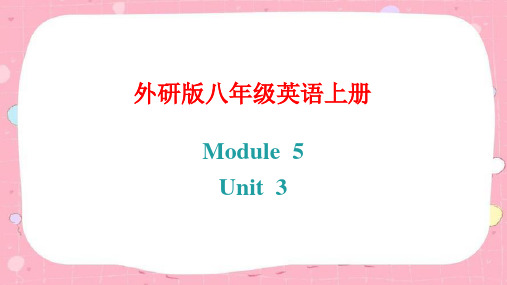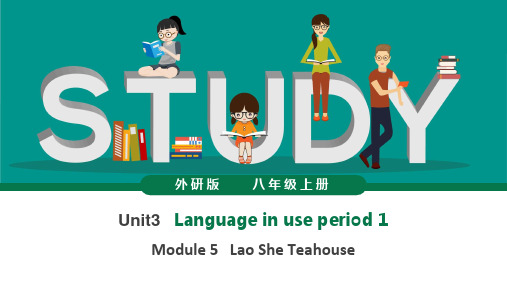module3unit5复习课件
合集下载
外研七年级上册Module 5 Unit3 教学课件(共57张PPT)

Module 5 Unit 3
4. In the UK, children have five lessons in the day
and finish school at half past three in the afternoon.
finish vt 结束; 完成
e.g.: (1) I finished reading a book.
Module 5 Museums
Unit 3 Language in use.
Planning a guide to a museum.
犍为县罗城初级中学教学课件V3. 0 制作人: 张平
Module 5 Unit 3
Language practice. 1. We have Chinese at eight o'clock. 2. We don't have math. 3. Do you like math? 4. Yes, I do. 5. In the evening, I watch TV and have dinner with my family.
Module 5 Unit 3
Language points. 1. On Friday I have a busy day.
busy adj 忙的; 繁忙的 e.g.: (1) I am always busy on Monday. (2) We spent a busy weekend again.
also 位于情态动词、助动词、be 之后, 实义动词 之前.
Module 5 Unit 3
Module task: Talking about your ideal school day
Activity 6. Look through Module 5 and find
九年级英语(上海教育版版)上册课件:Module 3-Unit5(共82张PPT)

3
17. 英格兰(n.)____E_n__g_la_n_d______ 18. 幸运的;运气好的(adj.)_____l_u_c_k_y_______ 19. 新闻报道(n.)_______n_e_w_s______ 20. 民意调查(n.)____s_u_r_v_e_y_______
4
重要词组: 1. 楼层平面图___fl_o_o_r_p_l_a_n_____________ 2. 达人秀___t_a_le_n__t _s_h_o_w___________ 3. 昏迷;失去知觉____p_a_s_s__o_u_t____________ 4. 保持静止____k_e_e_p__s_t_il_l ___________ 5. 紧急出口___e_m__e_r_g_e_n_c_y_e_x_i_t_______ 6. 在工作日(周一至周五)___o_n__w_e_e_k_d_a_y_s__________ 7. 领先_____a_h_e_a_d__o_f______________
14
Nothing took away from the beauty of the scenery / view. 什么也减损不了这景色的美。 My own view is absolutely clear. What I did was right. 我 的观点非常清楚。我所做的是正确的。 In my view, things won't change. 在我看来,形势不会改 变。
九年级 全一册 配上海教育版
●上册● Module 3 Leisure time
Unit 5 Action!
1
知识导航
关键词汇: 1. 赞扬;称赞(n.)___p_r_a_is_e__________ 2. 看;观看(v.)_______v_ie_w________ 3. 导演(n.)____d_i_r_e_c_to_r_______ 4. 化妆(n.)_____m__a_k_e_-u_p______ 5. 艺术家(n.)____a_r_t_is_t_________ 6. 演播室(n.)______s_tu__d_io_______ 7. 在……上(prep.) _____u_p_o_n_________
17. 英格兰(n.)____E_n__g_la_n_d______ 18. 幸运的;运气好的(adj.)_____l_u_c_k_y_______ 19. 新闻报道(n.)_______n_e_w_s______ 20. 民意调查(n.)____s_u_r_v_e_y_______
4
重要词组: 1. 楼层平面图___fl_o_o_r_p_l_a_n_____________ 2. 达人秀___t_a_le_n__t _s_h_o_w___________ 3. 昏迷;失去知觉____p_a_s_s__o_u_t____________ 4. 保持静止____k_e_e_p__s_t_il_l ___________ 5. 紧急出口___e_m__e_r_g_e_n_c_y_e_x_i_t_______ 6. 在工作日(周一至周五)___o_n__w_e_e_k_d_a_y_s__________ 7. 领先_____a_h_e_a_d__o_f______________
14
Nothing took away from the beauty of the scenery / view. 什么也减损不了这景色的美。 My own view is absolutely clear. What I did was right. 我 的观点非常清楚。我所做的是正确的。 In my view, things won't change. 在我看来,形势不会改 变。
九年级 全一册 配上海教育版
●上册● Module 3 Leisure time
Unit 5 Action!
1
知识导航
关键词汇: 1. 赞扬;称赞(n.)___p_r_a_is_e__________ 2. 看;观看(v.)_______v_ie_w________ 3. 导演(n.)____d_i_r_e_c_to_r_______ 4. 化妆(n.)_____m__a_k_e_-u_p______ 5. 艺术家(n.)____a_r_t_is_t_________ 6. 演播室(n.)______s_tu__d_io_______ 7. 在……上(prep.) _____u_p_o_n_________
Module5Unit3课件八年级英语上册

Maupassant (莫泊桑) was one of the most .1 famous .masters of short novels in the .2 nineteenth .century in France. His novels made readers .3 feel .excited.
do”.(
)
2. I can talk to someone by using “want to do” ,“need to do” and “decide to
do”.(
)
3. I can ask my friends or my classmates something by using “teach sb. sth.”
book的A、B、C三个选项中,选出可以填
入空白处的最佳选项。
( A )1. I will be happy ______________ you come to my party.
A.if
B.or
C.and
( C )2. ______________ is here except Jack. I think he’s late again.
( B )1. A.work B.study C.drive D.hide
( A )2. A.young B.tall C.fat D.strong
( D )3. A.reading B.listening C.playing D.writing
( A )4. A.His B.Your C.My D.Her
in many films.
A.doctor
B.waiter
C.actor
( B )5. In China,riding shared bikes is very ______________. Many people like
do”.(
)
2. I can talk to someone by using “want to do” ,“need to do” and “decide to
do”.(
)
3. I can ask my friends or my classmates something by using “teach sb. sth.”
book的A、B、C三个选项中,选出可以填
入空白处的最佳选项。
( A )1. I will be happy ______________ you come to my party.
A.if
B.or
C.and
( C )2. ______________ is here except Jack. I think he’s late again.
( B )1. A.work B.study C.drive D.hide
( A )2. A.young B.tall C.fat D.strong
( D )3. A.reading B.listening C.playing D.writing
( A )4. A.His B.Your C.My D.Her
in many films.
A.doctor
B.waiter
C.actor
( B )5. In China,riding shared bikes is very ______________. Many people like
教科版(广州)英语六年级上册Module3 Unit 5 课件

动词原形
ask stay learn smell 闻 play clean help start 开始
动词过去式
asked stayed learned smelled played cleaned helped started
1. What’s the matter with you? 你怎么啦? = What’s wrong with you?
1. health 健康(名词) ;healthy健康的(形容词) in good health 健康状况好 in poor health 健康状况不好 2. I brush my teeth twice a day. once一次 twice两次 three times 三次 four times 四次
MEDICINE (medicine)、 WATER (water)、
✓
✓ ✓
It was raining. He wore
walked to school
wet clothes.
had a cold
see a doctor
Grammar Time
P 30-31
表示地点和时间的介词
重点语法
Show time
准确 correct
声音大 loud
流利 fluent
Self-
合作 cooperative
创新 creative
assessment
have a stomachache
have a cold
have a broken leg
have a fever
have a broken finger have a headache
I feel…… I have……
外研版九年级英语下册课件 Module5 Unit3 (1)

am / is / are not going to … ➢特殊疑问句举例:
What will you do tomorrow?
When are we going to have a class meeting? 备注:在 if 条件或 as soon as 等时间状语从句中用一
般现在时代替一般将来时。
Grammar
行为动词的时态
一般现在时 一般将来时 现在完成时 过去将来时
八大时态: 现在进行时
一般过去时 过去进行时 过去完成时
一般现在时
➢ 用法:经常性的和习惯性的动作 ➢ 常用时间状语: in spring, every day, in the morning ➢ 动词构成: 动词原型 / 动词+ s (主语是第三人称单数) ➢ 否定构成:don’t + 动原 doesn’t + 动原 ➢ 一般疑问构成及简答:
5
Unit 3 Language in use
Language practice
I think it’s going to rain. He fell over when he was running down the steps. He’s hit his head and his leg hurts. I think he’s broken his leg. Who’s missing? Will I live?
一般过去时
➢用法:过去时间发生的或过去经常性的动作 ➢常用时间状语:yesterday, last night, two days ago,
in 2000, at that time … ➢动词构成:动词过去时(-ed) ➢否定构成:didn’t + 动原 ➢一般疑问构成: Did + 主语 + 动原 + 其它
What will you do tomorrow?
When are we going to have a class meeting? 备注:在 if 条件或 as soon as 等时间状语从句中用一
般现在时代替一般将来时。
Grammar
行为动词的时态
一般现在时 一般将来时 现在完成时 过去将来时
八大时态: 现在进行时
一般过去时 过去进行时 过去完成时
一般现在时
➢ 用法:经常性的和习惯性的动作 ➢ 常用时间状语: in spring, every day, in the morning ➢ 动词构成: 动词原型 / 动词+ s (主语是第三人称单数) ➢ 否定构成:don’t + 动原 doesn’t + 动原 ➢ 一般疑问构成及简答:
5
Unit 3 Language in use
Language practice
I think it’s going to rain. He fell over when he was running down the steps. He’s hit his head and his leg hurts. I think he’s broken his leg. Who’s missing? Will I live?
一般过去时
➢用法:过去时间发生的或过去经常性的动作 ➢常用时间状语:yesterday, last night, two days ago,
in 2000, at that time … ➢动词构成:动词过去时(-ed) ➢否定构成:didn’t + 动原 ➢一般疑问构成: Did + 主语 + 动原 + 其它
外研版英语八年级上册Module 5 Unit 3 课件

6
Listen again and check(√)the true sentences.
1 Steve went to Shakespeare's Globe Theatre last night. √□
玲玲主动提出来带我去。 3. We only _p_l_a_n_n_e_d_t_o_w__at_c_h__ for an hour.
我们原计划只看1小时。 4. I __h_o_p_e_t_o_u_n_d__er_s_ta_n_d___ more next time.
我希望下次去能听懂得多一些。
Language practice
—Mary was heard ____ just now . What happened?
—Joe was telling her some jokes. (随州)
A.cry
B.laugh
C.to laugh
D.to cry
解析:此题用词语应用法解答。hear sb. do sth.意为“听到某
(1)都有2个动词 (2)都有 to (3)第2个动词都是原形
你能总结出它们的用法吗?
语法专讲
一、动词不定式 (‘to-infinitives’)?
上面例子中主要行为动词后面的动词都采用“to + 动词原形”的结构,我 们把这种结构称为动词不定式。
动词不定式是一种非谓语动词,在句中能作主语、宾语、定语、表语和宾 语补足语。没有人称和数的变化,构成形式为to+动词原形。其否定形式 形式是“not+动词不定式”。本模块介绍动词不定式置于谓语动词后作宾 语,表明意图、计划、决定或希望。
跟不定式作宾语的动词:
?
agree,ask,decide,choose,come,expect,hope,fail, happen,help,learn,mean,manage,offer,plan,promise, refuse,seem,wait,wish...
外研版七年级英语下册Module 5 Unit 3

根据“Around the world”中的信息, 补全下列句子:
1. There are many w__a_y_s of s_h_o_p_p_i_n_g_ in America today.
2. _C_a_t_a_lo_g_u_e_ s_h_o_p_p_i_n_g_ is one of the popular ways.
3. You can buy almost _a_n_y_t_h_i_n_g_ you need.
4. Many people order their _m__u_s_ic_ and b_o_o_k_s_ from catalogues.
Module task:Writing a shopping list for a school picnic
Paying over the Internet isn’t always safe.
Presentation
Language practice
What colour does she like? What size does she take? How many/much would you like?
5 Work in pairs. Writing a shopping list for a school picnic.
● What food do you need? ● What drinks do you need? ● How much/many do you need?
Shopping List 1. ___st_r_a_w_b_e_r_r_y________ _2_k_i_lo_s_____ 2. __m__il_k______________ _1_0_b_o_t_t_le_s_(瓶_ ) 3. __w__a_te_r_____________ _1_0_b_o_t_t_le_s_(瓶_ ) 4. ___________________ __________
牛津深圳版(广州沈阳通用)八年级下册英语课件:Unit 5

上海教育出版社 八年级 | 下册
基础导航
二、根据汉语写出下列词组
1. 在野生环境中_______i_n__t_h_e_wild 2. 出生时_____a_t_b__ir_t_h________ 3. 独自_____o_n__o_n__e_’s__o_w_n_____ 4. 几乎;接近________c_l_o_s_e_t_o__ 5. 把……扔进_______t_h_r_o_w__…__i_nto 6. 写信给……________w__r_i_te__t_o_ 7. 谈论______t_a_lk__a_b__o_u_t_______ 8. 照顾______t_a_k_e__c_a_r_e_o_f______
上海教育出版社 八年级 | 下册
Complete the sentences with the words you have learnt. The initial letters have been given.
• A newborn baby usually weighs about three k_i_lo_g_ra_m__s . • Many people are working hard to keep e_n_d_a_n_ge_r_e_d____ animals from dying out. • We can find wild giant pandas in the mountains in C_e_n_tr_al__ and Western China. • Now let’s read the fact f_il_e_____ about South China tigers. •I hurt my s_ou_l_d_er___ when I was throwing the ball. •Nowadays, we cannot see many giant pandas or South China tigers in the w_il_d_____.
